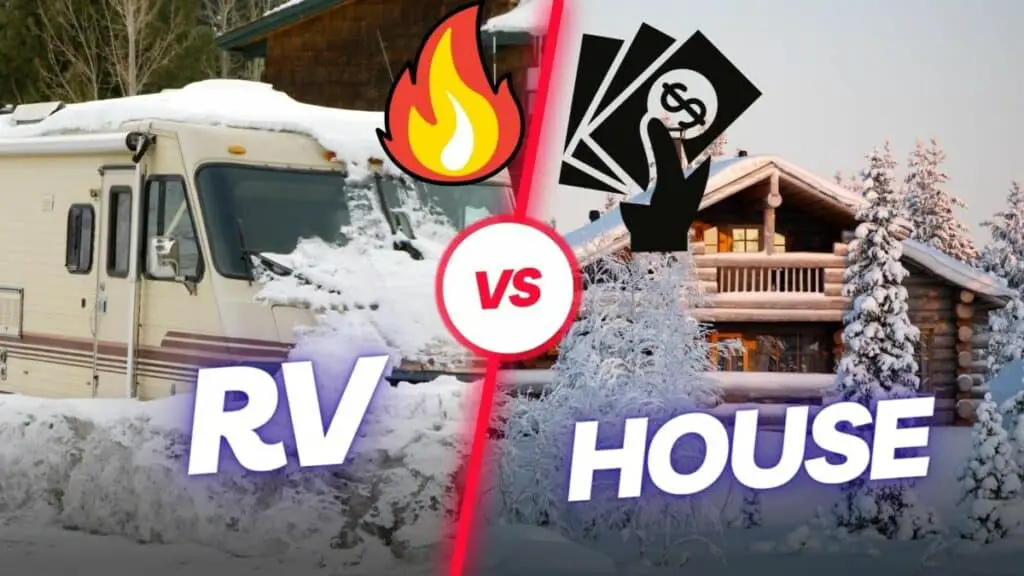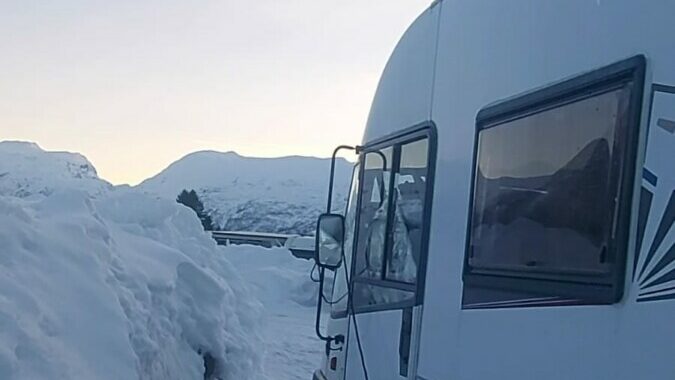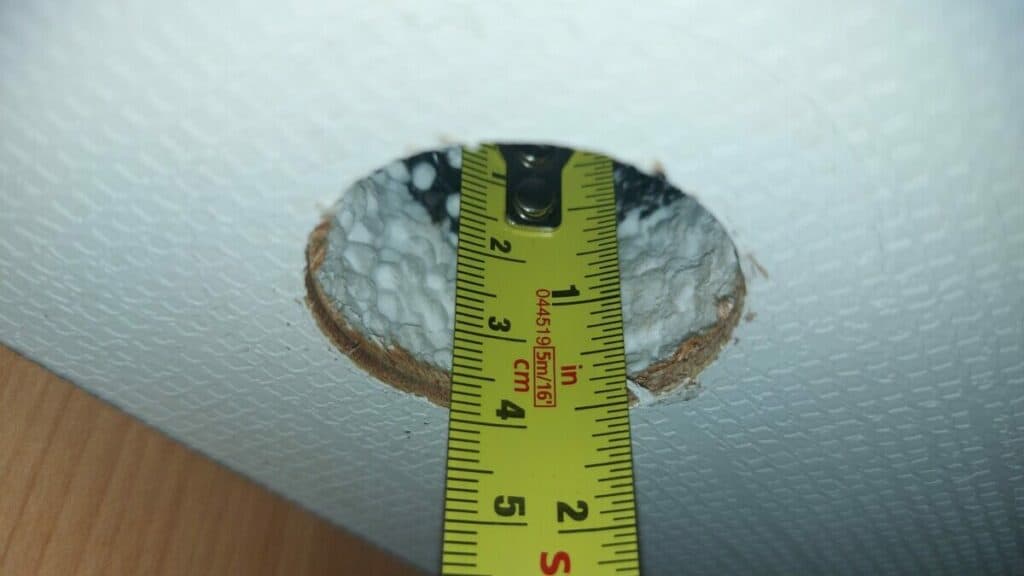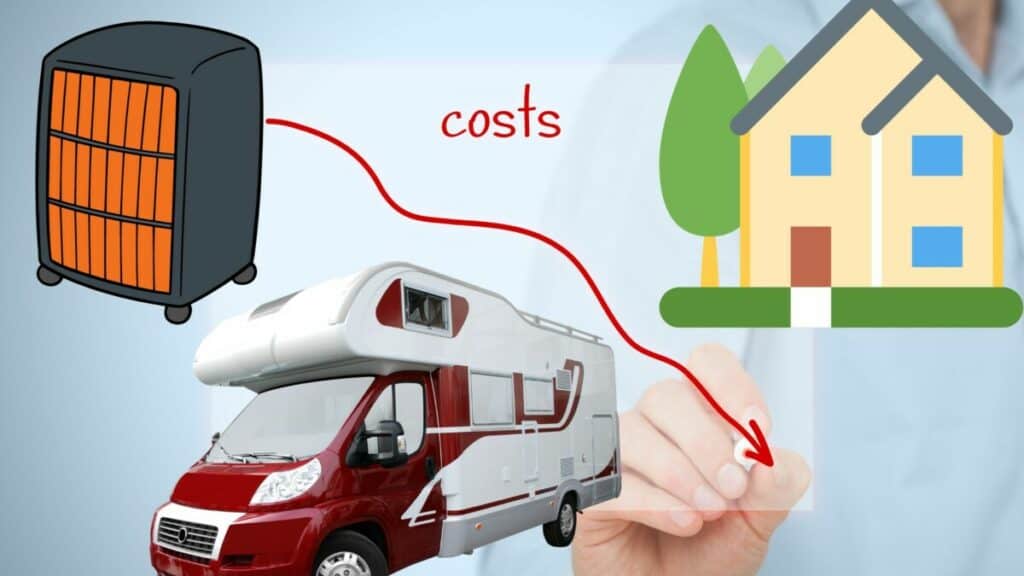This post contains affiliate links (I get a commission at no extra cost to you for purchases made through links in this post).

Winters can be brutal if you don’t have a good heating system to keep you warm. With rising heating costs, you might want to know whether it’s cheaper to spend the winter in an RV rather than a house.
While it costs about $300 a month to heat an RV in the winter, heating a house is significantly higher at around $500 a month. The overall costs depend on the temperatures and methods of heating used. For instance, using propane as fuel is much more efficient and cheap.
In this article, I will compare the costs of heating an RV and heating a house in the winter. I’ll discuss different factors that can affect the cost of heating as well as provide tips for minimizing the cost. Keep reading to learn the advantages and disadvantages of using an RV as your winter home.
Heating an RV vs. Heating a House
Heating an RV and heating a house are two different challenges that require different approaches. However, the cost of heating an RV or a house depends on similar factors.
Areas With Harsh Winters Cost More To Heat

Heating an RV or a house in a region with harsh winters is more expensive than heating in an area with milder winters. This is because colder climates require more energy to keep temperatures at optimal comfort levels. To combat higher costs, ensure that you have the proper insulation in your home or RV before the winter season begins.
Learn more about how to insulate your RV windows in this article that I wrote, where I go through the different options you have, as well as how I did it last winter that I spent in Norway.
Smaller Spaces Are Easier To Heat
RVs are typically smaller than houses, requiring less energy to warm up and maintain a comfortable temperature.
The ideal size of an RV for living in during winter will vary depending on individual needs and preferences. Generally, an RV between 30 and 35 feet (9 to 10.5 meters) in length is a good size for full-time living, as it provides a comfortable living space without being too large or costly to heat during winter.
RVs in this size range typically have enough space to accommodate a full kitchen, bathroom, and separate sleeping and living areas. They also offer enough storage space for long-term living and power and water capacity for extended use during winter.
Although my RV is almost half that size at 5.5 meters, that works for my wife and me! It is a bit tight in the winter, though.
Insulation Prevents Heat Loss During Winter

RVs typically have less insulation than houses, making it more difficult to keep the heat inside. Adding additional insulation to your RV or upgrading the existing insulation in your house can reduce the cost of heating.
You can insulate your RV against heat loss during winter in one or all of the following ways:
- Install insulation panels to the walls and ceiling.
- Apply weather stripping to the doors and windows.
- Install a skirting kit to enclose the bottom of your RV.
- Use reflective window covers to reflect heat inside.
I put in extra insulation to the floor of my RV, which I would recommend if you don’t have an RV that is made to withstand the cold weather, but more on how I did that, RV insulation, and the difference between winterized (Grade 3) & winterproofed (Grade 2) Motorhomes or RVs in my other article here.
Fuel Types Vary in Availability and Efficiency
Heating with propane may be cheaper than using electric heat, but the reverse may be true if you are located in an area with lower electricity prices. During winter, however, many RV campers benefit from switching to a propane-powered system since it typically provides more heat per unit of fuel consumed.
And when we talk about running appliances on propane, remember to never run any appliances on propane when you stop at a gas station since this is both illegal and dangerous but more on that in the video I made above.
Some Heaters Are More Expensive Than Others
Electric heaters are generally more expensive to operate than propane heaters. However, they can be the more economical choice if your house is in a region with cheap electricity prices. Conversely, some gas heaters are more efficient at converting fuel into heat, which can reduce the overall cost of heating.
A propane heater may be a good option for a larger RV, while an electric or infrared heater may be a better choice for a smaller space at temperatures that don’t go below freezing. When choosing a heater for your RV, consider the following:
- The size of your living space
- Your heating needs
- The availability of fuel or electricity
Comparing the Cost of Heating an RV to Heating a Small House
Compared to a small house, an RV typically costs less to heat in the winter because it’s smaller. However, a poorly insulated RV would require more heating sessions than a small house with better insulation.
The estimated costs of heating an RV compared to heating a house in winter are summarized in the table below:
| House (Electric) | House (Propane) | House (Diesel) | RV (Electric) | RV (Propane) | RV (Diesel) | |
| Cost per month | $100 – $300 | $200 – $500 | $250 – $600 | $50 – $150 | $100 – $300 | $100 – $300 |
| Efficiency | Moderate | High | High | Moderate | High | High |
| Fuel availability | Widely available | Widely available | Limited availability | Widely available | Widely available | Limited availability |
This table provides an overview of the efficiency and estimated costs of heating a house and an RV using different fuel types. Nevertheless, the actual costs can vary depending on your circumstances.
Here is another article that goes into more detail about the costs of heating an RV in winter from the experience I gathered last winter that I spent in my RV full-time in Norway.
Tips for Minimizing the Cost of Heating an RV or a House in the Winter

- Choose the right location: An area with mild winters or lower fuel prices can help reduce the overall cost of heating.
- Choose the right fuel type: Compare the costs of different fuel types and factor in their efficiency and availability. These can help determine the most cost-effective option.
- Invest in a high-efficiency heater: A high-efficiency heater produces more heat for the same amount of fuel. It can also minimize heat loss through the walls, windows, and roof of an RV or house.
- Use a programmable thermostat: A programmable thermostat allows you to set the desired temperature for different times and days of the week. You can turn off the heating when the RV or house is unoccupied.
- Close curtains and blinds at night: Doing so minimizes heat loss through windows. It is especially effective in RVs that have less insulation than houses.
Advantages and Disadvantages of RVs As Winter Homes
It’s quite difficult to use an RV as a permanent home, but it doesn’t hurt to use it for a few months during the winter. In fact, the perks might surprise you.
Some advantages of using an RV as a winter home include the following:
Requires Less Heat to Warm Up
RVs are typically more affordable than houses, making them a more budget-friendly option for a winter home. RVs are also smaller than most houses, requiring less heat to warm up and maintain a comfortable temperature. You can enjoy lower heating costs when you live in an RV for the winter.
Allows You To Explore New Areas

One of the key advantages of using an RV as a winter home is you’ll have the ability to move from one location to another. This allows for flexibility and the ability to choose a location with mild winters or lower fuel prices.
Additionally, the ability to move the RV allows for exploring different areas and experiencing new places.
Doesn’t Require Additional Furniture or Appliances
RVs are equipped with all the essential amenities for comfortable living, including a kitchen, bathroom, and sleeping quarters. You can move into an RV and start living immediately without needing additional furniture or appliances.
Additionally, RVs are typically self-contained and do not require connections to utilities such as electricity, water, and sewer. This can make them convenient for living in areas without these amenities.
Some disadvantages of living in an RV instead of a house during winter include the following:
Less Spacious Than Houses
Unlike typical houses, RVs have limited living and storage space. This can be a disadvantage for people or families with children who need more space for their belongings. If you’re going into winter in your RV, make sure you’re satisfied with the space in your RV or make adjustments to add more space.
The small size of our RV is one of the things we both love and hate about it, but more on that and other things we love and/or hate about our RV in the video above.
If you need more space but can’t get a bigger RV, you can use collapsible furniture or install slide-out rooms.
Fewer Amenities for Hobbies or Businesses
RVs are equipped with basic amenities for living, but they do not have the same features and amenities as a house. For example, RVs typically do not have a laundry room, a yard, or a garage. This can be a disadvantage for people who want these amenities or who need more space for activities such as hobbies or home-based businesses.
Privacy Can Be Limited
RVs are designed for living in a small area, so privacy can be limited. If this is an issue, you can try using curtains or installing privacy screens to provide a little more privacy.
Adding tents to an RV can be a good way to increase privacy, as they can provide additional separate living spaces. Tents can be attached to the side of an RV or set up next to it, providing additional sleeping areas or a separate area for relaxing and spending time.
Conclusion
It’s cheaper to heat an RV in the winter than it is to heat a house. Factors that affect the cost of heating include:
- Your location
- Size of your RV or house
- Type of insulation
- Type of fuel used
Considering these factors can help you determine the most cost-effective option. There are pros and cons to living in an RV during the winter, so you must take time to consider if this option is more suitable.
